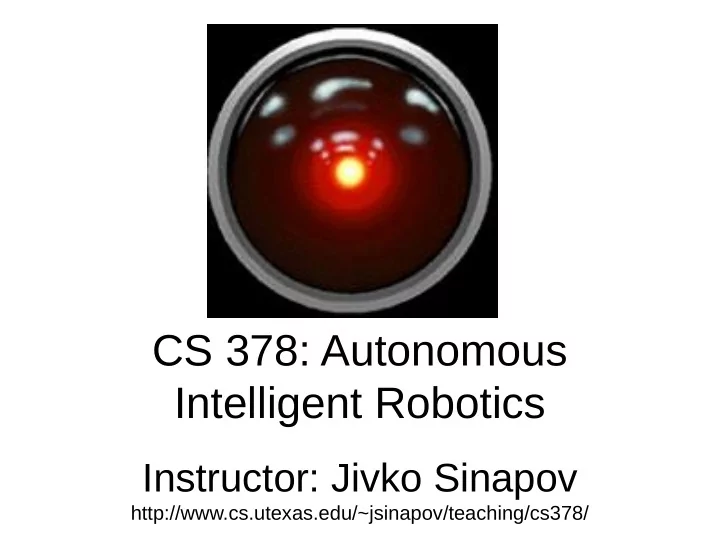

CS 378: Autonomous Intelligent Robotics Instructor: Jivko Sinapov http://www.cs.utexas.edu/~jsinapov/teaching/cs378/
Introduction to Point Cloud Library (PCL)
Announcements Homework 6 is out, due 4/5
Announcements Homework 6 is out, due 4/5
Final Project Timeline • Project Proposal due: Mar. 29 th Apr. 1 st • Project Presentations / Demos: Last Week of Class (May 3 rd and 5 th ) • Final Report due: May 11 th
Project Proposal • Format: PDF, single spaced • Submit on Canvas • Also, post PDF on Discussion Forum, state the project name and team members
Installing our code base • Github page: – https://github.com/utexas-bwi/bwi
Introduction to Point Cloud Library (PCL)
Main References • “Rusu, Radu Bogdan, and Steve Cousins. "3d is here: Point cloud library (pcl)." Robotics and Automation (ICRA), 2011 IEEE International Conference on. IEEE, 2011.” • “Tutorial: Point Cloud Library – USC Robotics Research Lab”
Why PCL?
The Impact of OpenCV
Traditional 3D sensors
Latest Technology
3D is now cheap!
What is PCL? Open Source C++ Library: http://pointclouds.org/ Cross-platform* (Ubuntu 12.04+, Windows 7+, Mac) Strives to be the equivalent of OpenCV for 3D
Who is developing it?
Who is paying for it?
What is a PCL point cloud? # .PCD v0.7 - Point Cloud Data file format VERSION 0.7 FIELDS x y z SIZE 4 4 4 TYPE F F F COUNT 1 1 1 WIDTH 2500 HEIGHT 1 VIEWPOINT 0 0 0 1 0 0 0 POINTS 2500 DATA ascii -0.0017353802 0.063134596 -0.047117598 -0.00391143 0.064091198 -0.047013 0.00073380599 0.064106099 -0.047437999 0.0021609101 0.063522704 -0.047437999 0.0072039799 0.063331202 -0.0471754 -0.0013178901 0.065206803 -0.0471658 0.00238145 0.0648202 -0.047421999 0.00742169 0.064781599 -0.0471754 -0.00240529 0.065845296 -0.046584301 0.0021517898 0.0657662 -0.047015704 . .
Types of Point Clouds XYZ:
Types of Point Clouds XYZRGB:
Types of Point Clouds XYZ+Normals:
PCL Breakdown
PCL Breakdown
Getting a Point Cloud from an OpenNI Sensor Code sample and Demo
PCL Breakdown
Downsampling a Point Cloud
Change Detection using Octree
Octrees An octree is a tree data structure in which each internal node has exactly eight children. Octrees are most often used to partition a three dimensional space by recursively subdividing it into eight octants. Octrees are the three-dimensional analog of quadtrees.
Octrees Application: change detection
Segmentation
Example: finding the floor and the table
Robots and Tables
An Example in 2D
An Example in 2D
An Example in 2D
An Example in 2D
An Example in 2D
An Example in 2D
An Example in 2D
An Example in 2D
An Example in 2D
An Example in 2D ...and so on until line stops changing
RANSAC “Random sample consensus (RANSAC) is an iterative method to estimate parameters of a mathematical model from a set of observed data which contains outliers. “ - Wikipedia
RANSAC [https://upload.wikimedia.org/wikipedia/commons/c/c0/RANSAC_LINIE_Animiert.gif]
RANSAC [http://www.visual-experiments.com/blog/wp-content/uploads/2012/04/ransac_line_fitting1.gif]
Finding a plane using RANSAC
Cylinder Detection with RANSAC https://www.youtube.com/watch?v=tasdvsnGCH0
Cluster Extraction
Cluster Extraction
Cluster Extraction Cluster 2 Cluster 1
Cluster Extraction in PCL • Code example
Further Applications • Obstacle Detection: – https://www.youtube.com/watch?v=jHKzBMK k4hY • Tracking 3D objects: – https://www.youtube.com/watch?v=NzRME9 ZEOnY
Resources • Main website: https://ointclouds.org • Tutorials: http://pointclouds.org/documentation/tutorials/ • API: http://docs.pointclouds.org/1.7.2/ • Blog: http://pointclouds.org/blog/
THE END
Recommend
More recommend